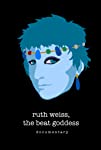Eye For Film >> Movies >> Ruth Weiss: The Beat Goddess (2019) Film Review
Ruth Weiss: The Beat Goddess
Reviewed by: Jennie Kermode

Before Ginsberg, before Ferlinghetti, before Corso and Kerouac, there was Ruth Weiss. In 2017, when most of this film was shot, there was still Ruth Weiss, still rocking sequinned garb onstage, at ease in masculine clothing, with short teal hair and matching nail varnish and socks, chain smoking, gravelly voiced, 88 years old and wholly uncompromised, still creating poetry that mattered. The reason why you might not know her name is almost too obvious, too trite to exist. “We don’t publish women,” she remembers one executive telling her outright. But she was right there at the heart of it nonetheless, and her work helped to define an era.
As she sits at her typewriter (despite calling herself “the worst typist in the whole world”), drinking from a pewter goblet, Ruth tells her story – or rather, a succession of stories from an exceptionally rich life which one suspects could yield a great many more. She recalls a poem she wrote as a young child, about a bear, and the precious doll and book of fairy tales which she took with her from Berlin, where she was born in 1928, to Vienna, where her news editor father moved the family five years later. To be Jewish and an intellectual was to face double jeopardy, and so the family set off for Switzerland the day after Hitler annexed Austria, but it was to prove a difficult and dangerous journey. Rather than holding onto the misery which so many people in her shoes were unable to shake off, Ruth remembers the kindness shown by strangers – sometimes the last people one might expect. The presence of mind which she exhibited as a young child is striking, an early sign of the qualities which would see her pursue her own intellectual ambitions regardless of the opposition she faced.

Beat poetry, she explains, was invented almost by accident. A friend seized the poems she was writing, excited by her talent, and carried them off to show to the jazz musicians playing upstairs. She pursued him, started reading one of them and suddenly found herself with an accompaniment. She discusses how she moved to San Francisco for the fog, her memories illustrated with simple drawings and photographs, describes watching the sun rise in a ‘borrowed’ car with Kerouac asleep in the back. He would drink red wine and she would drink beer and they exchanged haikus which she wishes she’d held onto to make herself rich. Cassidy, Ginsberg and Burroughs were also around from time to time, exchanging ideas, supporting each other, though the men would become famous and the women – several others get a mention here, and there’s some focus on her friendship with Gwendolyn Brooks – would largely be forgotten.
Ruth herself stepped outside of gender bounds. The masculine way in which she dressed was, in the Fifties, something which could easily have seen her assaulted or arrested. Still more scandalous her work with the Coquettes and her engagement with the nascent LGBT rights movement, which was closely linked to the poets’ fight against censorship. The Good Gay Poets Press was the first to publish her work, and she was the first woman they took on (making way for a succession of important lesbian poets, though that isn’t covered here). She remained politically active throughout her life. We see her speaking at 2019 Women’s March, easily commanding a crowd of people a quarter of her age. We see her expressing her concerns about environmental degradation and climate change.
Love is also here. The film touches on her relationship with her partner of 41 years, Paul Blake, who painted, drew, and made her clothes and earrings. It also celebrates the unexpected joy she found in falling in love again at 80, with 60-year-old percussionist Hal Davis, who gave up a lifetime of wandering to be with her. Even at that stage, he had to compete for her time, as she ran poetry nights and never stopped writing and performing.
Reflecting an energy which its elderly subject could no longer put across physically, the film uses two ballerinas to express something of her passion, one dancing in the desert, the other in urban spaces. We see clips from Ruth’s appearances in Steven Arnold’s experimental films, which capture some of the vitality of her youth. “I’ve had so much magic in my life, it’s incredible,” she says, but it’s her own magic which compels. She died before this documentary made it to the screen, but it’s a fine tribute which, one hopes, will pave the way for many viewers to discover the voices of the missing beat poets, and for serious scholarship to give these women the platform they deserve.
Reviewed on: 20 Aug 2022
















